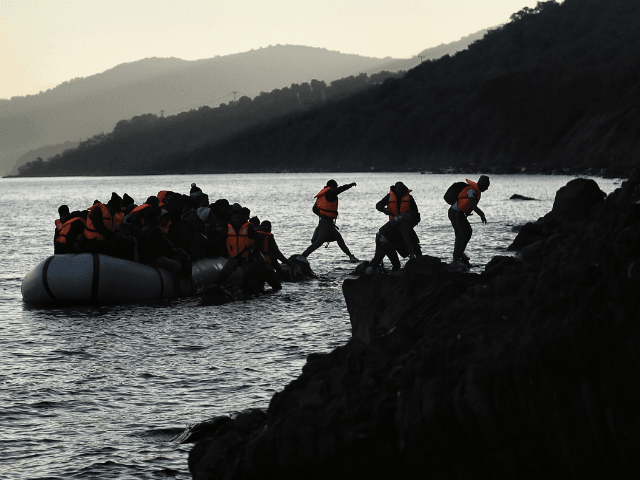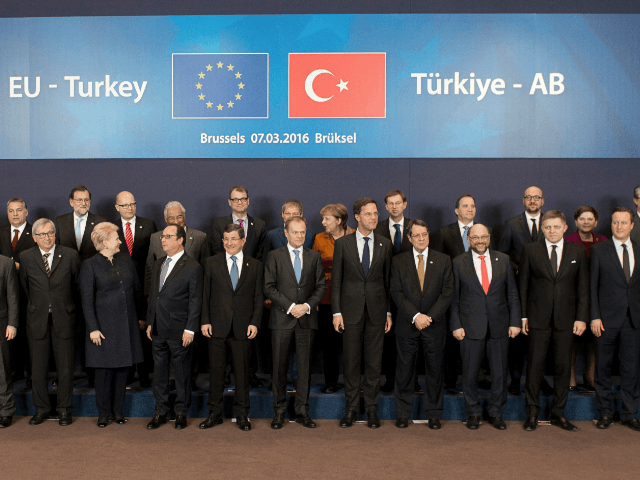GENEVA/BRUSSELS (Reuters) – The United Nations and human rights groups warned on Tuesday that a tentative European Union deal to send back all irregular migrants to Turkey in exchange for political and financial rewards could be illegal.
“I am deeply concerned about any arrangement that would involve the blanket return of anyone from one country to another without spelling out the refugee protection safeguards under international law,” U.N. High Commissioner for Refugees Filippo Grandi told the European Parliament in Strasbourg.
He was speaking hours after the 28 EU leaders sketched an accord with Turkish Prime Minister Ahmet Davutoglu in Brussels that would grant Ankara more money to keep refugees in Turkey, faster visa-free travel for Turks and a speeding up of Ankara’s long-stalled membership talks.
Rights group Amnesty International called the proposed mass return of migrants a “death blow to the right to seek asylum”. Relief charity Doctors without Borders said it was cynical and inhumane.
But the executive European Commission insisted the deal to put an end to a mass influx of more than a million people fleeing war and poverty in the Middle East and beyond, due to be finalised next week, was fully legal.
German Chancellor Angela Merkel, who pushed for the accord to assuage anxious voters before regional elections on Sunday, said things were finally moving in the right direction after nearly a million Syrians, Iraqis, Afghans and others flooded into Germany alone last year. She denied accusations that Turkey was using refugees to blackmail Europe.
The 28 EU leaders were taken by surprise by the bold, last minute Turkish initiative, which went beyond previous plans for more limited cooperation. Unable to sign up to firm commitments immediately, they agreed to wrap up a deal at their next summit on March 17-18 but several points remain sensitive.
Migrants marooned in squalor on Greece’s frontier with Macedonia by the closure of borders further north vowed to keep trying to cross Europe to wealthy Germany, while Syrian refugees in Turkey said they too would not be deterred by the lockdown.
“We will stay here even if we all die,” said Kadriya Jasem, a 25-year-old from Aleppo in Syria, one of 13,000 people living in a makeshift camp in Idomeni on the Greek side of the border with Macedonia.
ONE-FOR-ONE
Under the tentative deal, the EU would admit one refugee directly from Turkey for each Syrian it took back from the Greek Aegean islands, and those who attempted the perilous sea route would be returned and go to the back of the queue.
The aim is to persuade Syrians and others that they have better prospects if they stay in Turkey, with increased EU funding for housing, schools and subsistence.
EU officials questioned how the one-for-one scheme would work in practise, with several EU countries objecting to any quota system for resettling refugees.
It might also be overwhelmed if the volume of migrants crossing the Aegean remains high despite increased NATO-backed sea patrols by Greece and Turkey.
Brussels sought to dismiss concerns over the legality of the proposed re-admission arrangements.
“You can be sure that the agreement that will come at the end of it will comply with both European and international law,” Commission spokesman Alexander Winterstein told a news briefing.
Commission chief Jean-Claude Juncker cited EU asylum procedure rules to argue that member states were entitled to refuse to consider a claim from a person who arrives from a safe third country.
Some Commission officials have private misgivings both about Turkey’s “safe” status, given its human rights record, and the compatibility of mass returns with asylum seekers’ right to an individual assessment of their claim, an EU source said.
It was unclear whether an eventual deal could be challenged in European or international courts. Any case might take years to reach a ruling, with EU doors closed in the meantime.
Migration experts said refugees would likely try other routes if Turkey’s closure worked. Estonia, Latvia and Lithuania have begun tightening identity controls and erecting fences on their eastern borders, fearing the Baltic region will become a new entry point for migrants.
“MISERABLE”
EU Migration Commissioner Dimitris Avramopoulos, speaking in the European Parliament, welcomed the preliminary deal and said: “We need now to ensure a quick implementation of the voluntary humanitarian scheme from Turkey and to implement projects that will further improve the situation of the Syrians in Turkey.”
But many lawmakers criticised the strategy to regain control of the influx, saying the EU must ensure people needing international protection are able to claim asylum.
“In the name of ‘realpolitik’, member states seemed ready to trample on their principles to conclude a shameful bargain with Turkey,” the French Socialist group said.
Critics denounced a cascade of border closures down the main Western Balkan migration route that has left 33,000 people stranded in Greece, causing a humanitarian catastrophe.
Avramopolus responded on Twitter: “It is our responsibility to create more legal pathways for people in need of protection to come to Europe legally and safely.
“Let me assure you that @EU_Commission does not forget and does not forsake its humanitarian duties.”
While Poland and others fretted about where the EU would find the money to double the existing 3 billion euros earmarked for Syrian refugees in Turkey, Cyprus dug in its heels on advancing Turkey’s EU accession process.
Nicosia has blocked the opening of five so-called negotiation chapters – vetting Turkish compliance with EU rules – to demand recognition by Ankara and trade access. It says it will not lift objections until Turkey opens its ports and airports to Cypriot-registered traffic.
Turkey has no diplomatic ties with Cyprus, an ethnically divided island which joined the EU split in 2004 and which is represented by the Greek Cypriot government. Ankara maintains ties with a breakaway Turkish Cypriot state in northern Cyprus.
The two Cypriot communities are negotiating a peace deal to overcome 42 years of division, but until there is movement, Nicosia looks set to keep blocking Ankara’s EU progress.
(By Stephanie Nebehay and Gabriela Baczynska. Additional reporting by Alastair Macdonald in Brussels, Lefteris Papadimas in Idomeni, Greece, and Michele Kambas in Nicosia; Writing by Paul Taylor; Editing by Giles Elgood)


COMMENTS
Please let us know if you're having issues with commenting.